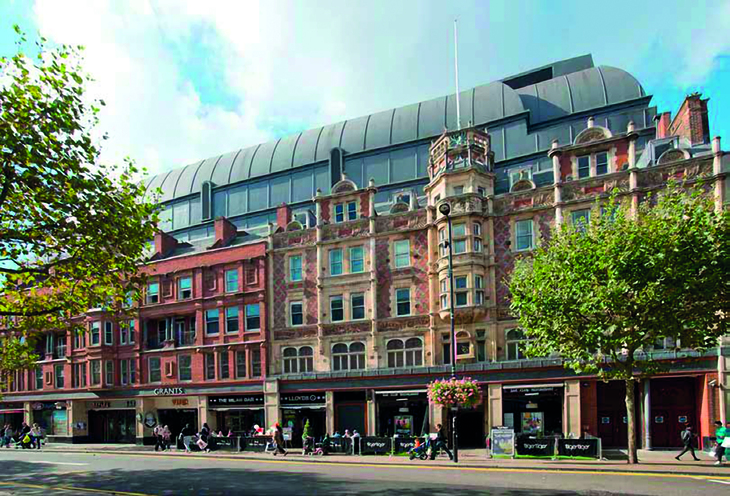
In the last five years, 83% of Britain's remaining department stores have closed. London itself has lost Arding & Hobbs at Clapham Junction with its clock tower visible for miles around, the House of Fraser (formerly D. H. Evans) in Oxford Street, its near neighbour Debenhams (formerly Marshall & Snelgrove), and House of Fraser, formerly Army & Navy, in Victoria Street.
But, as Tessa Boase shows in her new book, London has been losing its department stores for a long time, and many of their impressive buildings — some true architectural landmarks — survive in a variety of uses. Here are 10 whose glamorous past lives you may be unaware of.
1. A grand bookshop, Piccadilly

Until 1999, the flagship of Waterstones on Piccadilly was the Simpson department store — and a masterpiece of modernist art deco. Now Grade I-listed, the building retains its Travertine marble staircase, along with its superbly curved and slanted display windows, and sells Booker prizewinners rather than DAKS trousers. The fifth floor hosts a restaurant, but not, unfortunately — as it did for the department store's grand opening in 1936 — three aeroplanes.
2. A discount grocery store, Peckham Rye

This beloved grocery store just across from Peckham Rye station was formerly Holdrons — once part of first the Selfridges, and later the John Lewis, chain. In 2019 Mr Khan took down the false ceilings installed after closure to reveal a fabulous vaulted glass ceiling, made up of a thousands pieces of Lenscrete. Further restoration to the store's Moderne glory continues.
3. Luxury flats, Notting Hill

This 'prestigious, portered block' in Chepstow Place, W11, was until 1952 Bradleys’ department store, and Europe’s biggest specialist retailer of furs, with clients including Clementine and Winston Churchill and Queen Mary. A fleet of six Chrysler limos was commissioned to ferry favoured customers around.
4. A sports shop and bank, Fulham

A branch of Sports Direct now stands in North End Road, Fulham where, until as late as 1994, Barbers' department store catered to the local community. It didn't install a lift until as late as 1988; Janet Street-Porter recalled her young self wide-eyed at its Lamson pneumatic tube system whizzing payments around the store "like something out of a Dickens novel".
5. Workspaces, bistro and rooftop garden, Brixton

The imposing corner building next to the Brixton Academy was formerly Toplin House, the well-appointed staff accommodation for the Bon Marché department store alongside. Now it's been stylishly repurposed as architects' offices, a bistro and a workspace — table top table tennis and all.
6. Newspaper offices, Kensington

House of Fraser closed the Barkers department store — one of a line of three in Kensington High Street — in 2006; nowadays its upper floors are the headquarters of the Daily Mail Media Group, while a Wholefoods Market has set up shop at street level.
7. A Waitrose, South Hampstead

It was the opening of Brent Cross, London's first shopping mall, that did for John Barnes' department store on the Finchley Road and forced the John Lewis Group to shut it in 1981. But its superb Streamline Moderne architecture survives as another avatar of John Lewis: a Waitrose.
8. A Police station, Lewisham

Between the wars, the people who ran department stores were as much fairground barkers as retailers, and Chiesmans department store in Lewisham High Street used to attract the punters with a veritable zoo of animals — from elephants to snakes, and even Vixen the lioness from Chipperfield's Circus. But House of Fraser shut it in 1997, the building was demolished, and now Lewisham’s sizeable police station stands in its place.
9. Health club and pub, Croydon

Of Croydon's three substantial department stores, Grants was its Harrods. When Croydon Airport opened between the wars, French aristocrats would fly across the Channel to buy their suits at Grants, and in 1960 the Queen and the Duke of Edinburgh stopped there for tea. But it closed its doors in 1980, and its mock Queen Anne façade became home to a Virgin Active and a Wetherspoon. The former is now a Nuffield Health, while the Wetherspoon has since closed.
10. A Travelodge, Woolwich

Opposite the Streamline art deco of the Royal Arsenal Co-Operative Society's department store in Powis Street, Woolwich, stood the earlier redbrick art deco of Tower House, the organisation's headquarters. The store closed in 1999, and nowadays Tower House is a 120-bed Travelodge.

London's Lost Department Stores: A Vanished World of Dazzle and Dreams by Tessa Boase is published by Safe Haven.
We featured this book because we know it's the kind of thing our readers will enjoy. By buying it via links in this article, Londonist may earn a commission from Bookshop.org — which also helps support independent bookshops.


